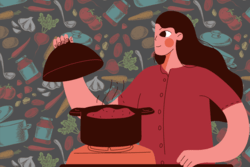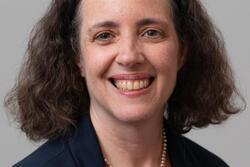Four Questions for Passover 2021
Why is Passover a time of questions?
The simple answer is that good questions elicit good learning, and the seder is meant to be an educational experience that encourages exploration and fosters a sense of belonging. Questioning, too, is an expression of agency and authority; making questions the currency of the seder invites all those present to see themselves as free people with the right and obligation to ask questions and attempt to answer them.
In times of transition—like the Exodus from Egypt, and like this moment in which we find ourselves at Passover this year—we yearn for answers. When the sands are shifting beneath us, when the waters of the sea cease to follow reliable tides, we seek certainty to moor us.
But the big questions of the seder—not the traditional Four Questions, which have concrete answers, but the existential questions about injustice, freedom, and what it means to be part of a people—are lifelong investigations that even the longest seder cannot fully answer.
Before we can find our way on the path to liberation, we must first craft the questions that will guide our journey. This year, we at the Jewish Women’s Archive (JWA) articulated four questions that challenge us and animate our work in this moment.
How can our communities better embrace and celebrate the “mixed multitude” (“erev rav,” Exodus 12:38) of the Jewish people?
How will we address gender inequity—revealed and reinforced by the pandemic—so that we can cultivate the Miriams of the future?
How will we join together to dismantle white supremacy and antisemitism so that we may all live with freedom, safety, and belonging?
How will we fulfill the obligation to tell our stories to future generations?
Learning and change begins with stories, so the final question offers a guide for approaching the rest. Telling our stories is an act of freedom, of creativity, of self-determination. We define ourselves—as individuals and as a people–through the stories we tell.
The Jewish obligation to tell our stories is a tool of survival that has stood us in good stead over millennia, building our resilience from generation to generation. It is not meant, however, to be merely an act of repetition or tradition. Rather, it is also a provocation to examine and reconsider the framework, boundaries, and assumptions implicit in our stories. We must do this by always querying further: Whose stories are we telling? Whose voices are we not hearing? Who do we mean when we say “we” in the first place?
At JWA, we address these essential questions and their initial answers with the stories of women, still too often pushed to the margins, forgotten, or—as the pandemic has made abundantly clear—devalued, their vital contributions taken for granted. We lift up the stories of women who have shaped our world through lives traditional and revolutionary, behind the scenes and at center stage, as family builders and independent pioneers, as outcasts and communal leaders, as visionary young people and wise elders. Doing so does not merely add to the story, it fundamentally changes its contours and its messages about who makes history.
Our feminist commitment begins, but does not end, with women’s stories. Rather, bringing a feminist lens to Jewish history requires that we continue to look to the margins and expand our narratives, listening always for the unheard voices, without abandoning gender as a central category of analysis.
The necessary companion to telling stories, of course, is listening. Deep, active, intentional listening, not only to practiced storytellers, but also to tentative ones, to quiet voices, to words that are swallowed, omitted, and drowned out. Preparing to answer any of these questions will require listening to the stories that are hard to hear, that disrupt the usual narratives, and being willing to reshape our own stories in response, in ways that may not be flattering.
The four questions above do not reflect competing priorities, but rather work together with the potential to mutually support and reinforce one another. Answering them will require equal measures of humility and confidence: humility about what we know beyond our own experiences, and confidence in our capacity to learn. We must recognize the partiality of our vision, and believe in our ability to see other perspectives. We must also have faith that we can hold multiple, even conflicting, truths at once. Just as the human brain takes the information from the left eye and from the right eye and integrates it into one coherent vision, so too do we need to exercise our vision muscles so that we don’t mistakenly assume that looking at one issue requires looking away from another.
Like all good questions, those that JWA poses this year generate further questions more quickly than they do answers. The answers will be shaped by the ways in which we make space to ask these questions and others; listen to answers both tentative and impassioned, especially those that come from new voices; trust in our ability to hold the difficult truths that emerge; and create new, multivocal stories together.
We wish you a meaningful Passover. May next year find us further along in our journey toward liberation.







I agreed until the white supremacy comment. We must dismantle all type of racism. Just pointing out the few white supremacists does nothing to bring forth equality. Racism is from all groups. Perhaps something about forming structures that are fair and open to all. But promoting racism as your question does is not profitable or accurate.
Great artwork. I have to reflect on Judith's reflections before I comment, but I'm sure they will be most fruitful. Thank you, Judith. from Thelma (in Toronto).